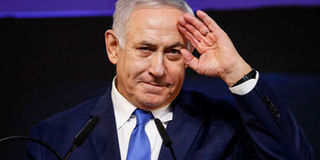Netanyahu win gives US peace plan 'better chance': Trump

Israeli Prime Minister Benjamin Netanyahu gestures as he addresses supporters at his Likud Party headquarters in the Israeli coastal city of Tel Aviv on election night early on April 10, 2019. PHOTO | THOMAS COEX | AFP
What you need to know:
- Nearly complete results in the tight election put Mr Netanyahu in position to form a narrow parliamentary majority with a coalition of right-wing and religious parties, allowing him to become Israel's longest-serving prime minister.
- Mr Trump predicted a boost to his administration's promised plan for a settlement to the Israeli-Palestinian conflict.
- Mr Trump has enthusiastically backed Mr Netanyahu, making controversial gestures of support to the hawkish leader, including recognition of Israeli sovereignty in the occupied Golan Heights area.
WASHINGTON,
President Donald Trump said Wednesday that election results handing a narrow victory to right-wing Israeli Prime Minister Benjamin Netanyahu give a "better chance" to a yet to be unveiled US peace plan.
"I'd like to congratulate Bibi Netanyahu," said President Trump after nearly complete results put the incumbent premier in position to form a coalition.
Mr Trump predicted a boost to his administration's promised plan for a settlement to the Israeli-Palestinian conflict.
"The fact that Bibi won, I think we'll see some pretty good action in terms of peace," he said.
"Everybody said you can't have peace in the Middle East with Israel and Palestinians. I think we have a chance and I think we now have a better chance," he added.
Nearly complete results in the tight election put Mr Netanyahu in position to form a narrow parliamentary majority with a coalition of right-wing and religious parties, allowing him to become Israel's longest-serving prime minister.
PEACE PLAN
Mr Trump has enthusiastically backed Mr Netanyahu, making controversial gestures of support to the hawkish leader, including recognition of Israeli sovereignty in the occupied Golan Heights area.
The peace plan is being developed by Mr Trump's son in law, Jared Kushner.
Palestinian leaders have indicated they are deeply skeptical, given Mr Trump's all-out support for Mr Netanyahu.
Mr Kushner is an Orthodox Jew and has huge business dealings and other ties to Israel, making many question his ability to serve as a broker between the two sides.
US officials have so far only revealed vague outlines of what the plan might propose, but Secretary of State Mike Pompeo suggested it could break abruptly with precedent.
"I'm very confident that what was tried before failed," he said Tuesday in congressional testimony.
That could mean revisiting longstanding US support for the creation of a future Palestinian state.
Asked if he stood by the so-called "two-state solution," Mr Pompeo repeatedly declined to answer firmly.
ISRAELI CONTROL
This comes as Mr Netanyahu says he could annex Jewish settlements built in the Israeli-occupied Palestinian West Bank -- a move that would seek to formalise Israeli control over parts of the supposedly future Palestinian state.
Such a move would previously have been almost unthinkable, leaving Israel diplomatically isolated. But some analysts believe that Washington's relatively less controversial Golan Heights recognition may have paved the way.
In another sign of Israel's current feeling of strength, PM Netanyahu insisted last week that he would refuse removal of any Jewish settlements built inside occupied Palestinian land as part of any peace plan.
He said he told President Trump "there shouldn't be the removal of even one settlement."
Since taking office, Mr Trump has also moved the US embassy from Tel Aviv to the politically contested city of Jerusalem, closed the Palestinians' office in Washington, pulled the United States from UN bodies accused of anti-Israel bias and cut off funding for the UN agency that provides schooling and other services to Palestinian refugees.





